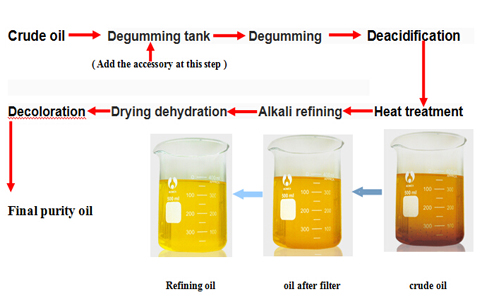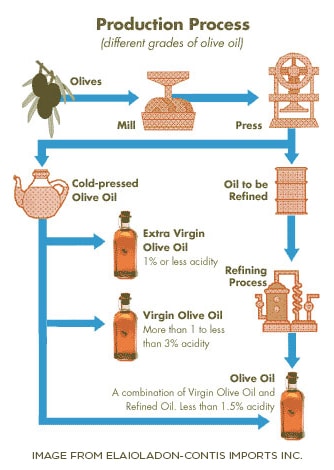Don’t smoke your oil!
Do you like to pan fry? Sauté? Deep fry? Are you worried that you have to use certain oils, ones with a high smoke point? But, what if it’s not the healthiest oil?

Last choice
For your health, generic “vegetable oils” should be your last choice. Typically a blend of vegetable seed oils such as soybean, safflower, sunflower, canola, and corn, the vegetable oils in Supermaxi or your local tienda are typically intensively heat-processed with chemicals unless they are labeled “organic.” For those who want to avoid genetically modified plant foods, many of these oilseeds are genetically engineered to resist pesticides. Some swear by shortening, but since it’s high in trans fat, that’s off the list.

Vegetable oil refining process
Lard is a popular cooking oil (pig fat), but commercial lard can be just as adulterated and chemically processed as commercial vegetable oil blends. Like shortening, the lard you buy in supermercados is typically hydrogenated, making it high in both saturated and trans fats. Although the jury is out on all saturated fat being bad for your heart, hydrogenated fat is double-trouble for your heart and your health.
You might think that if you’re cooking at high heat it’s necessary to use oil with a high smoke point. Smoke point is the temperature at which oil will begin to degrade. Many, if not most restaurants and street food vendors use refined vegetable oils for high-temperature cooking — refining removes impurities and increases the smoke point (and these oils are also a fraction of the cost of unprocessed, unrefined oils).

Best choice.
Many health experts point to the scientific evidence that a Mediterranean-type diet is healthiest for your heart — and advocate for oils high in monounsaturated fats such as extra virgin olive oil.
Eric Decker, an oil expert, and chair of the department of food sciences at the University of Massachusetts Amherst assures us that for home cooking, even lower smoke-point extra-virgin olive (EVOO) is best. He says, “For the amount of time you’re going to cook, and the temperatures you’re going to get to, your oil is not going to undergo oxidation.”
As reported in NutritionAction.com, Dr. Decker recommends unrefined EVOO which contains a lot of naturally occurring antioxidants including vitamin E.
EVOO is natural crushed olive juice, not altered by chemicals, solvents or heat.

Dr. Decker says, “If you’re just pan-frying, no oxidation probably occurs. Even with deep-fat frying at home, oxidation is minimal.”
If your oil starts to smoke, throw it out and start again.
Dr. Decker also explains that it’s not only high temperature that causes oxidation — it’s time plus temperature. Oils contain vitamin E (a protective antioxidant) naturally, but all oils can become oxidized when stored in a too-hot cabinet (near, over, or next to your oven). He also cautions against buying the “extra-large” size — instead, purchase in small amounts, keep tightly sealed and store in a cool, dark place.
Some suggest that refrigerating oils is a good idea. Yes, they will go cloudy and firm up in the refrigerator, but a few minutes at room temperature will do the trick. Instead of refrigerating the whole bottle, transfer your unrefined oils to a wide-mouth mason jar, refrigerate and then scoop out what you need.
Dr. Decker suggests extra-virgin olive oil is a stable oil and keeps his extra-virgin in a small bottle at room temperature. If he buys a larger-size bottle, he’ll transfer a small amount to a small bottle, and keep the rest refrigerated.
Can the “olive oil fridge test” tell you if your oil is “real” EVOO? As usual, if Dr. Oz recommends it, take the advice with a grain of salt.

As reported in the Olive Oil Times, the Oz claim is a myth. He said if you refrigerate EVOO and it “solidifies” at refrigerator temperature, “… then you’re pretty sure it’s pure.” According to the North American Olive Oil Association, the home test is “completely false and misleading.”
Almost any oil will solidify at cold temperatures, depending on its chemical compounds, and even within the EVOO category, factors such as olive variety and time of harvest will affect solidification.
About Cooking Oils
According to the Berkeley Wellness Newsletter, organic, cold-pressed oils are best and safest, and avoid refined vegetable oils.
They write, “To produce canola (and other vegetable) oils, the plant’s seeds are crushed and then typically heated and subjected to chemical solvents, like hexane, to extract the oil. Manufacturers claim that virtually all the solvent is then removed, but it’s unclear whether trace residues might be a health hazard; hexane also has adverse environmental effects.
Cold- and expeller-pressed oils, including canola, do not involve the use of chemical solvents and, because they undergo less processing, tend to be higher in nutrients and antioxidants. They also cost more.”
EVOO — Most health experts point to the evidence that a Mediterranean-type diet is healthiest for your heart, and advocate for cold-pressed oils high in monounsaturated fats such as extra virgin olive oil. Extra-virgin olive oil has a lower smoke point, good for sautéing, great in salads and dressings.
Avocado oil — a bit expensive, but it’s flavorful oil, high in monounsaturated fats, with a higher smoke point than olive oil, good for frying.
Pure sesame oil’s smoke point, like olive oil, is too low to be suitable for deep-frying, but it’s good for sautéing. It’s flavorful and will impart its flavors to your food.
Coconut oil — extra-virgin coconut oil is not processed and chemically refined, and it has a moderate smoke point. Good for sautéing and baking too.
Flaxseed oil is very flavorful and has a very low smoke point, so it’s not suitable for cooking, but it’s good in a salad dressing.
Safflower oil — typically refined, a good option for frying and sautéing, since it has a very high smoke point and a neutral flavor.
Peanut oil is very flavorful and imparts that flavor to food. It’s got a high smoke point making it good for frying and sautéing. Typically refined on the shelf.
Sunflower and corn oil have a lower smoke point, and since they’re mainly polyunsaturated fat, they’re not as stable as virgin olive oil at higher heat.
Purchasing in Cuenca
I put the word out to my Facebook friends for feedback about their favorite oils and where to buy them. Unrefined, virgin oils, are more expensive than cheap vegetable oils, but a little of the good stuff goes a long way, especially when you’re not deep-frying. Typically restaurants serving deep-fried foods use cheap, refined, heat-and-chemically-treated vegetable oils.
Here in Cuenca, there are many places to buy EVOO and other unrefined fruit oils like avocado and sesame and coconut oils. Of course, there’s no guaranty that what’s on the label is in the bottle which is why many prefer to build relationships with small organic shops and buy in small quantities, both to see if you like the flavor and to preserve freshness.
Click on the name of the stores I’ve recommended below to access their website or Facebook page and locations. Feel free to add your own recommendations in the comments below. Thanks!
Supermaxi has a wide assortment of extra-virgin olive oils, and a smaller selection of avocado, coconut, and almond oils. One reader recommends the Mira brand of avocado oil. One friend recommended Mallorca EVOO, and another recommended the Carbonell brand of EVOO.
Mega Tienda del Sur on de Las Americas has a selection of EVOO and I’m told the prices are good.
Khatu Organic on Hermano Miguel has a selection of organic and unrefined oils and other products.
Pacha Kuna Mercadillo for EVOO and other organic products.
Tienda Nectar on Benigno Malo sells EVOO, extra virgin coconut, pure and unrefined sesame and avocado oils, and red palm oil, which the owner says is locally sourced and unrefined. They also have ghee, which is clarified butter, very popular in Indian food, and its high smoke point is higher than most other oils.
Feel free to share where you buy your favorite oils in the comments below.
Sources
Berkeley Wellness. Understanding vegetable oils. http://www.berkeleywellness.com/healthy-eating/food/article/understanding-vegetable-oils
Nutrition Action Newsletter. Does cooking make your oil dangerous?
https://www.nutritionaction.com/daily/fat-in-food/does-cooking-make-your-oil-dangerous/
Olive Oil Times. Olive oil fridge test? Don’t count on it. https://www.oliveoiltimes.com/olive-oil-basics/olive-oil-fridge-test/32830





















